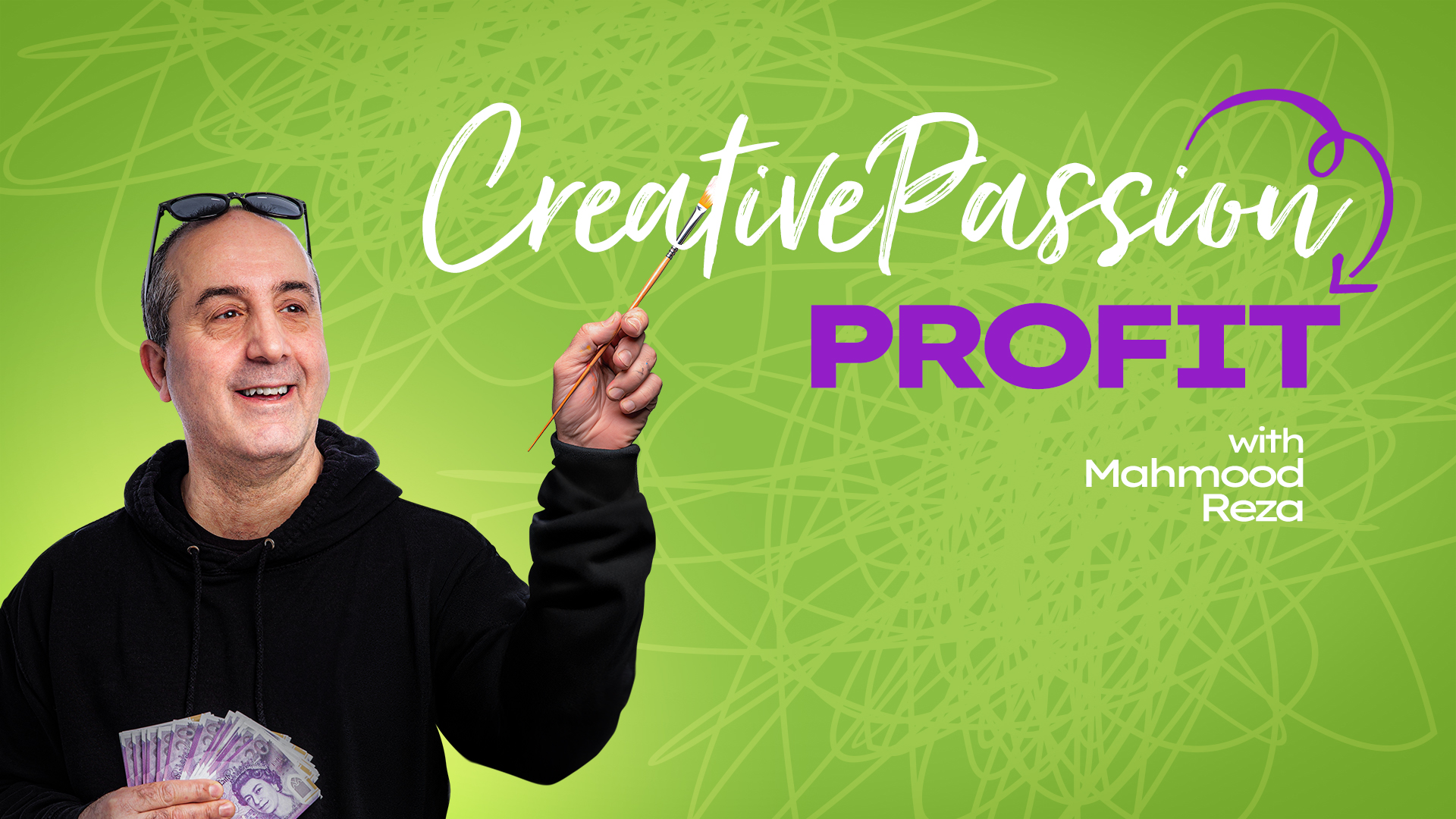Cash flow management
If you run a business, you know how cash flow can feel like a constant headache. But what if managing your business’s lifeblood could get a whole lot easier? In this episode of "From Creative Passion to Profit", I’m getting into the topic of cash flow management.
Not just as a concept you’ve heard tossed around, but as a practical, vital skill you can actually master.
Whether you’re just starting out or you’ve been struggling to stay ahead, this episode arms you with seven straightforward strategies I’ve seen work first-hand.
I’m not just handing you lofty ideas; I’m giving you actionable steps, cautionary tales, and real business knowhow you can’t afford to miss.
Wonder how to build a real safety net for your company, make solid decisions about spending, or know when to borrow? I cover that, and so much more, pulling back the curtain on the choices that make or break businesses every day.
Timestamped Summary:
- [00:00:00] I kick off with why cash flow management is the most critical part of survival for any business, even ahead of profitability.
- [00:01:02] I lay out the first strategy: creating a cash reserve, suggesting a practical three to six months of operating costs as a buffer against tough times.
- [00:01:59] We talk about cost consciousness—how to develop and stick to a minimum viable budget even during profitable periods and why discipline matters.
- [00:02:39] For product-based businesses, I discuss inventory management and the hidden costs of overstocking or mismanaging stock.
- [00:03:26] I explain the pros and cons of leasing equipment versus buying outright, especially the immediate impact on cash reserves.
- [00:04:17] I introduce equipment loans as another valuable finance option, particularly for specialized purchases.
- [00:04:40] I highlight the strategic advantage of borrowing when business is good rather than waiting for a crisis—prevention over cure.
- [00:05:04] In the final strategy, I drive home the value of a great accountant for forecasting issues before they hit, and summarize how all these steps build a sturdy, sensible cash flow foundation for your business.
- [End] You’ll learn why planning for the worst, not just hoping for the best, is key to long-term business success.
Mentioned in this episode:
Find out more about Budgetwhizz
Find out more about Budgetwhizz
Training
Training
Transcript
Good cash flow management is vital, nay critical
Speaker:to the success of your business. In fact, it's a
Speaker:stated truth that if your business does not have access
Speaker:to cash resources, does not have access to
Speaker:the ability to manage cash flow correctly, then survival
Speaker:is going to be seriously questioned. You can survive
Speaker:without making profits for a period of time, but you can't survive without
Speaker:cash access to cash. So it's vital that as a business
Speaker:owner, as somebody who runs a business, cash flow, though it
Speaker:may feel like the headache and pain of your life, is an absolute
Speaker:necessity. And in this week's podcast, I've got seven strategies
Speaker:to make this process easier and to ensure that your business stays on
Speaker:track for financial success. Let's dive into it.
Speaker:Number one Create a cash reserve. It's always a good
Speaker:idea to have a safety net in place. A cash reserve is going to help
Speaker:you to cover unforeseen costs, keep your business
Speaker:afloat. Should there be any change in activity,
Speaker:should the outlook be bleak, should disaster
Speaker:strike, you're going to be covered. As a rule of thumb, and this is something
Speaker:I borrow from the not for profit, from the arts and creative sector,
Speaker:three to six months of operating costs of average cash
Speaker:flow is a good buffer to have. Think about if your
Speaker:business stood still and no more customers bought from you, how
Speaker:much money would you need to keep ticking over for the next three to six
Speaker:months? And that's your aspirational target. Number
Speaker:two, cost consciousness or frugality if you prefer.
Speaker:Now, every business owner knows it can be difficult to find a balance between
Speaker:growth and cautious spending. However, it's important
Speaker:to develop a minimum viable budget. Yeah, I use that word
Speaker:budget and continue to stick to it even when cash is
Speaker:flowing into your your business. Having that sense of financial discipline
Speaker:is really an important thing to adopt. Good times don't always
Speaker:last forever and if you're unable to save money when the going is good,
Speaker:it's going to be pretty tough to do that when times get tougher.
Speaker:Number three, if you're a product based business, keep an eye
Speaker:on your inventory. Managing your inventory poorly will
Speaker:create a lot of expensive problems which will impact
Speaker:severely on your cash flow. It costs money to acquire
Speaker:the inventory. That's money tied up. It costs you money to hold inventory
Speaker:and it costs you money to manage inventory. So we need to make sure that
Speaker:balance of how much inventory we need to fulfill demand.
Speaker:Not overstocking, not having obsolete inventory items that we're
Speaker:carrying. That's dead money effectively until it's sold. We need to make sure
Speaker:that balance is correct. Now, when you don't organize your
Speaker:inventory correctly, there may be items you misplace that
Speaker:aren't stored correctly, that become obsolete or damaged, and we might end up
Speaker:ordering replacements basements that we don't actually need. The next thing to
Speaker:consider is about leasing your equipment. Now some business owners
Speaker:prefer to purchase assets outright and to own them.
Speaker:And purchasing equipment in its own right might prove to be more effective
Speaker:and cheaper in the long term and it may have an impact on profitability,
Speaker:but it also might damage your cash reserves in the short term.
Speaker:Investing Buying expensive upgrades can present a real
Speaker:problem when funds are tight. Now leasing and again
Speaker:on one respect might be more expensive. However, it's going to
Speaker:free up cash flow, it's going to be less cash commitment, less cash
Speaker:outflow going out of your bank, and it helps you to monitor and
Speaker:regulate your cash flow more easily. And a lot of leasing higher
Speaker:purchase arrangements. Here you may have the option to purchase the equipment
Speaker:outright at the end of the term of the agreement
Speaker:or to even upgrade number five equipment
Speaker:loans. Now, instead of purchasing outright, you might
Speaker:want to consider something called an equipment loan. And this type of loan functions in
Speaker:much the same way as a traditional bank loan, but the risk profile
Speaker:is lower. The market is there for you to have a shop around and have
Speaker:a look at those options about how you finance and fund that equipment. And
Speaker:again, an equipment loan may be something that's going to be more suitable for
Speaker:your business type. Now this might seem like contradictory terms
Speaker:but but the next thing to consider is you borrow when the going is good.
Speaker:Now prevention is always going to be better than a cure. So borrowing money when
Speaker:your finances are looking good may actually prove to be a good thing
Speaker:for you. Better to open a line of credit now until you be able to
Speaker:use it later than risk rejection from the bank when
Speaker:you're already in peril. In addition to this, seeking a loan when
Speaker:your business is in good financial health gets you better rates and it
Speaker:gives you the freedom to shop around. Now the last one,
Speaker:and I'll give you a bonus at the end, is to hire a good accountant.
Speaker:Now cash flow problems often sneak up on business owners they shouldn't
Speaker:do. And it definitely pays to have a professional on side who can
Speaker:spot problems from a mile off and give you solutions before your business
Speaker:starts to suffer. In my own practice, I hate numbers and through
Speaker:numbers know how we support a number of clients by helping them do
Speaker:forecasting, preparing budgets. Having a look through the windscreen of your business
Speaker:is better than getting caught out by unexpected
Speaker:surprises. Now, good cash flow management, folks, in summary, is
Speaker:about preparing for the worst and maintaining those sensible,
Speaker:yep, sensible financial habits even when the going is
Speaker:good. Creating that cash buffer, that cash reserve, remaining
Speaker:cost conscious and keeping on top of your inventory. You can
Speaker:protect yourself against the cash flow problems that cause havoc
Speaker:on many small businesses. It's certainly worth considering borrowing during
Speaker:the good times and considering equipment, loans or leases rather
Speaker:than shelling out cash immediately. Maintain that healthy cash
Speaker:flow. Make sure you've got the accountant advising you and
Speaker:helping you with your forecasting, and making sure your bank balance stays as
Speaker:healthy as it can for years to come.




